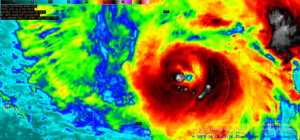
There are two important components of hurricane forecasting: the hurricane track (where it is going) and hurricane intensity (how and if its winds are increasing).
Hurricane forecasts are becoming more accurate and are extending further out in time. Accurate forecasts provide needed information to make sound decisions and effective risk communication. In addition to improved hurricane forecasts, technological advances, such as smart phone apps, are making the information more accessible and can alert those in harm’s way.
Track forecast error is defined as the great-circle distance between a hurricane’s forecast position and the actual position at the forecast verification time. As one might expect, the errors get larger the further out the forecast.
The 24- and 72-hour track forecast errors over the past 30 years have improved, a trend where the errors have decreased by 70 to 75%. Consider the 2020 hurricane season as an example. This was an extremely active year, having 30 named storms. The 2020 mean track errors were 41 miles at 24-hour forecast, while during the period 2005-2010, the 24-hour track forecast error was 58 miles. Track forecast error reductions of about 60% have occurred over the past 15 to 20 years for the 96- and 120-hour forecast periods.
The improvement in hurricane track forecasts is due to several factors. We now have better and more satellite observations, new observations from drones carrying weather instruments, and more aircraft with better instruments observing hurricanes. Super computers that are faster improve forecast models by allowing more energy and dynamic processes to be incorporated more explicitly into the forecast. Due to improved observations, we can include better descriptions of the initial state of the atmosphere into the models, which leads to more accurate predictions of a storm’s behavior.
Forecasting the intensity of a hurricane has only gradually improved in the last two decades, so work remains to be done in that arena. While we still lack the ability to accurately forecast hurricane intensity, our understanding of how hurricanes evolve has grown substantially.
Steve Ackerman and Jonathan Martin, professors in the UW-Madison department of atmospheric and oceanic sciences, are guests on WHA radio (970 AM) at 11:45 a.m. the last Monday of each month. Send them your questions at stevea@ssec.wisc.edu or jemarti1@wisc.edu.

